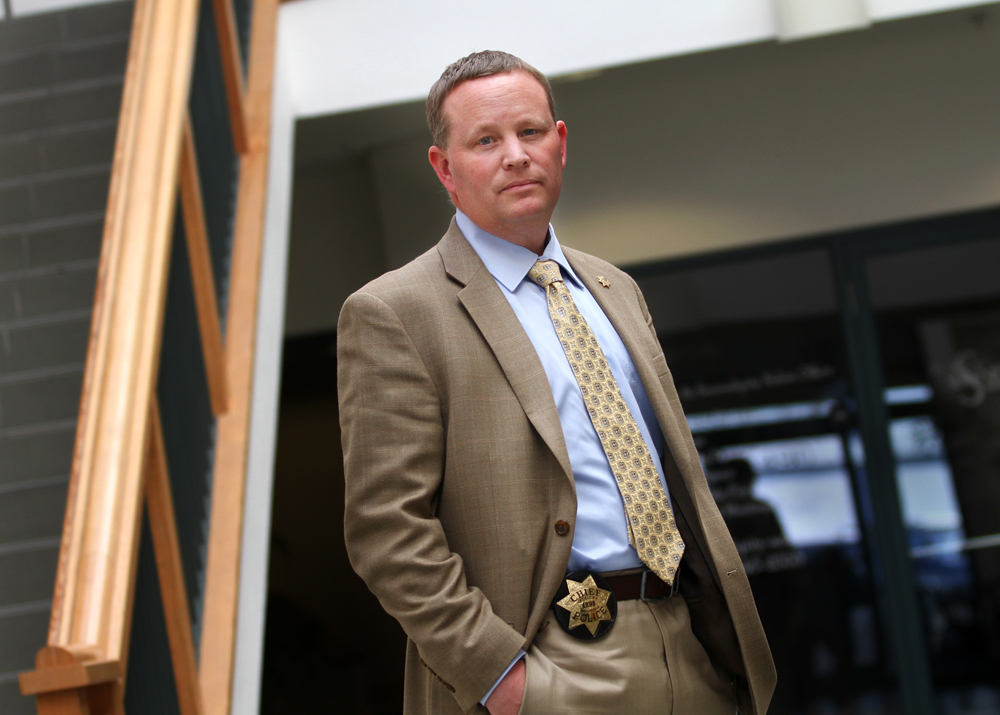By SHELDON BERMONT / Petaluma Towns Correspondent
After three years as Chief of Police and 23 years with the department, Danny Fish has weathered his share of budget fluctuations. But when funding for his pet project disappeared three years ago, he fought back.
This year, Fish was able to bring Drug Abuse Resistance Education (D.A.R.E.) programming back to nine Petaluma classrooms, funded entirely by donations. He considers it money well spent on prevention rather than enforcement.
“It seemed like a real logical step to reach these kids at a younger age instead of expending police department time and effort in dealing with the fallout at the teenage level,” he said.
City budget cuts ended Petaluma’s D.A.R.E. program, reducing the number of sworn officers and sending the school resource officer back to regular street duty.
Fish remained confident that D.A.R.E. needed to be part of what his department’s mission, so he started exploring new ways to configure and fund it.
The entire program used to be spearheaded by one assigned officer on a specific three- to five-year assignment whose salary came out of the police department budget.
“Now, we have three police officers who have taken on their D.A.R.E. duties as a secondary assignment,” Fish said. They volunteer for it as a “side job” and earn overtime for it.
The department’s overtime payroll covers such things as the SWAT team, gang enforcement and hostage negotiation. To pay for the D.A.R.E. program’s $8,000 budget, Fish found several new funding sources.
The Petaluma Board of Realtors is the strongest, designating a percentage of proceeds from its annual golf tournament, usually about $5,000. The McDowell Drug Task Force provides about $3,000.
Fish also worked on ways to spread the message without requiring an officer’s presence, such as holding school-wide poster contests. It’s worth the effort, he said, because the program has a lot of value.
“It teaches kids early on about the dangers of drugs, alcohol and tobacco and the importance of staying away from these substances,” Fish said.
“The kids are given skills and knowledge to make the proper choices when they confront peer pressure to go down the wrong road.”
Another important part is “the exposure of the sixth-graders to my police officers,” he said. “This allows young citizens to become comfortable with our department, and a working relationship based on mutual trust and respect is formed.”
Petaluma’s D.A.R.E. program is aimed at sixth-graders, this year graduating its first group of three schools early in February. Fish considers it “preventative medicine” just before substance abuse problems historically become an issue.
“When D.A.R.E. had to be cancelled, the schools were very disappointed, and the parents of the incoming sixth-graders felt equally let down,” Fish said. “I get regular feedback from the community that D.A.R.E. is something they do not want to lose.”
In the long run, Fish considers it a way to combat the ever-shrinking police-to-citizen ratio. Petaluma now has 63 officers serving 55,000 residents, down from 77. That translates to 1.09 officers for every 1,000 residents, the lowest ratio in 25 years.
Officer Nick McGowan signed up for D.A.R.E. duty a year ago. He has been a police officer for 8½ years and with the Petaluma department for six, specializing in gang intelligence.
“When you get involved with youth and foster positive relationships,” he said, “you have a better chance of deterring negative and potentially violent behavior patterns later on.”
Fish agrees. “All through my career, I’ve always been attentive to the youth population,” he said. “Our community’s youth is one of our greatest assets.
“They are the ones we will entrust to carry on community good will and a sense of responsibility for where they live.”

